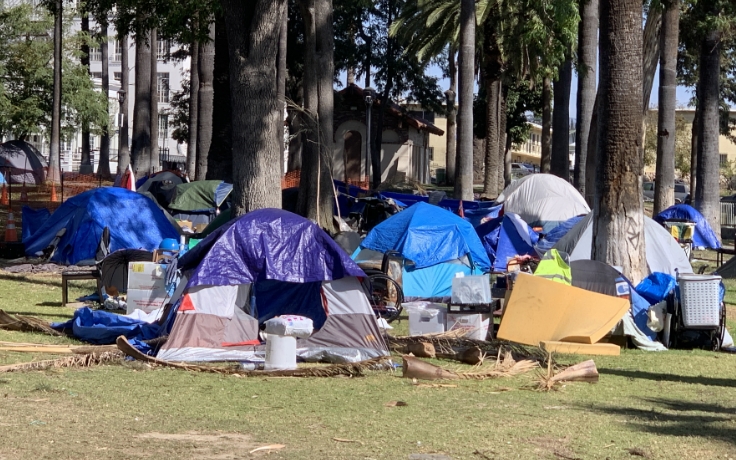AFTER THE CITY ELECTION IN JUNE, once the field of candidates had narrowed to two, Blueprint reached out to the remaining contenders for their thoughts on some pressing issues. What follows is what we are calling a “virtual debate,” in which Congresswoman Karen Bass and businessman Rick Caruso were given six questions and asked to answer them in writing. Both candidates had until the end of August to respond (both, incidentally, missed their deadlines but requested and received extensions). The candidates were directed to keep their answers to 200 words or less, and both did so.
Neither candidate was allowed to see the answers supplied by the other, and they were not given an opportunity to respond. Their answers are published here in full, with only minor copy editing.
Blueprint: Please identify a past mayor, of Los Angeles or elsewhere, whom you admire and whose work would help guide your decision-making.
Karen Bass: I remember wearing my Tom Bradley for Mayor pin in high school — and being questioned by my teachers as to whether I actually knew what he stood for. I did, and I continue to draw inspiration from the strong coalition he built to win and to lead the city. Antonio Villaraigosa also built a broad, citywide coalition, and at the same time I was making tough decisions to protect California’s economy in the face of the greatest economic decline since the Great Depression, he was making tough decisions to keep the city of Los Angeles afloat — and tough decisions are needed once again at City Hall. The best way to bring about change is involving as many people as possible in your efforts. For the three of us, coalition building isn’t about getting together to sing kumbaya — it’s about marshaling power, marshaling resources and marshaling the energy of residents committed to getting big things done.
Rick Caruso: Mayor Tom Bradley taught me so much about leadership and management. It was an honor to serve under his administration. He showed us how to bring people together and get things done for Angelenos. Unfortunately, he is no longer with us so I won’t be able to seek his guidance as mayor.
Another leader I admire is Jerry Brown. As mayor of Oakland and as governor, I admired his work and would look to him for guidance and inspiration. Gov. Brown governed with pragmatism, moral principle and, most importantly, empathy and compassion for those in need the most. Whether it was his revitalization of downtown Oakland with over $1 billion in investments or his focus on improving the port, Jerry put the people first and always acted with clear goals and accountability. I admire what he accomplished as mayor and as governor. I consider him a friend and someone I could turn to for advice and guidance.
Blueprint: Two-part question: Do you see homelessness principally as a law enforcement matter or as a human crisis? And how will you pay for your solutions?
Caruso: Homelessness is a human crisis, period. We need to bring people inside, off the streets, where we can get them the care and attention they deserve and need. Some homeless people just need a helping hand, while others may need mental health or addiction treatment to get them back into the social fabric of L.A. Regardless, enforcement is not the answer and it will NOT solve the problem. As for how to pay for my initiatives on sheltering the unhoused, I believe there is more than enough General Fund money in addition to state and federal dollars that are available for emergency housing, shelter and treatment/wraparound services.
Bass: The homelessness crisis in Los Angeles is a humanitarian disaster, and I will not accept what City Hall has accepted for so long. Instead, my administration will provide 15,000 people in the first year with immediate housing. The bottom line is that we will stop “addressing” homelessness and will focus on solving homelessness. This is an all-hands-on-deck crisis that requires comprehensive and creative policies to both lift people from homelessness and keep Angelenos from losing their homes by building and protecting affordable housing and by confronting the full range of challenges that lead to homelessness, including low wages and job loss, substance abuse, illness, disability, mental health challenges, domestic violence and a lack of reentry services.
I will build on my experience and relationships with federal, state and county decision-makers to secure additional resources for housing and services, and I will make sure that the city and county work in lockstep.
Blueprint: How should Angelenos judge the performance of the Los Angeles Police Department? In your view, how well is the department doing its job today?
Bass: Angelenos should judge our city government based on how safe our city is. Public safety depends on more than the LAPD, and it’s unfair to our officers that they are left to pick up the pieces from a shredded social safety net. The department has come a long way since I first started working on community-police partnerships in the 1990s, but we still have a long way to go.
Reducing uses of force and improving policing and community relations will be key metrics during my administration. In addition to leading the department to lower our crime rate, I will make sure we invest in proven initiatives to reduce crime.
Caruso: While president of the Police Commission, I helped oversee a 30% drop in crime, in addition to making the department a “minority-majority” department with more Latinos, African Americans and API police officers than ever before. We also brought in [Chief] Bill Bratton and focused on community policing, ensuring that the communities the police served felt heard, safe and connected to their police officers.
That is how the LAPD should be judged, by how safe and connected people feel to the men and women who serve in uniform.
Blueprint: It has been 20 years since the Los Angeles City Charter was overhauled. Would you support efforts to revamp the charter again? Specifically, would you support a significant expansion of the Los Angeles City Council?
Caruso: I would absolutely support an overhaul of the charter and I would consider adding more council members. However, I do not believe that more elected officials will solve the problems we face. We need leadership and accountability, not more elected officials with large staffs who focus on their next elected job. I’m running for mayor because I believe I can contribute to fixing the problems that Los Angeles faces because I don’t need to rely on campaign contributions or political endorsements to get my next job. We need more accountability, not more politicians.
Bass: The next mayor must roll up [his or her] sleeves and get big things done on homelessness, public safety and affordability before we start evaluating charter amendments.
Blueprint: What role, if any, should the mayor play in the primary and secondary education system for young Angelenos?
Bass: I am a proud product of Los Angeles’ public schools, and as mayor I will be a strong supporter of public education. My focus will be on unhoused children, securing resources for mental health services for students and providing safe and enriching after-school programming. I will also advance “community schools,” which are open to the local surrounding neighborhood with programming and services.
Caruso: Without state legislation and charter reform locally, the mayor can only play the role of booster and to some extent use the bully pulpit to improve and influence the school system. While I think there could be merit in concentrating accountability of the school system in the mayor’s office, I also firmly believe we need to focus first on solving the problems of homelessness, crime and corruption to ensure our children can walk to school safely and without fear, that our parents and teachers can focus on their child’s education and not on school lockdown drills.
Blueprint: Based on your viewing of the hearings of the Select Committee to Investigate the January 6th Attack on the United States Capitol, and any other sources you may have, do you believe Donald Trump should be criminally prosecuted for his role in the effort to disrupt the peaceful transition of power from himself to Joe Biden?
Caruso: I spoke about the horrible events of January 6 immediately after it became clear what had actually occurred, and it’s in large part why I registered as a Democrat after being an independent. The insurrection that occurred that day, and the coverup and continued lies around that day, are a stain on our democracy and a day that we should never forget.
The authorities investigating the events have the tools and evidence to determine if charges are warranted. We should trust and respect their process. Regardless, I remain a firm believer that our democracy is stronger than ever. We have stood against those actions and rejected them in the past, and we will continue to do so.
Bass: Donald Trump must be prosecuted for the damage he has done to our nation, our institutions and our standing in the world, to hold him accountable and to prevent another president from following in his footsteps. There was ample evidence of crimes in the Mueller report, but his unprecedented efforts to thwart the will of the voters and prevent the peaceful transfer of power for the first time in this nation’s history indisputably demand justice.
As a member of the House Foreign Affairs Committee, I can assure that were he a foreign president, our government would have regarded his actions as a coup, and if he was successful, sanctions would be imposed. It is important for the United States of America to remain a beacon of democracy for the world — that requires accountability for Donald Trump.

























